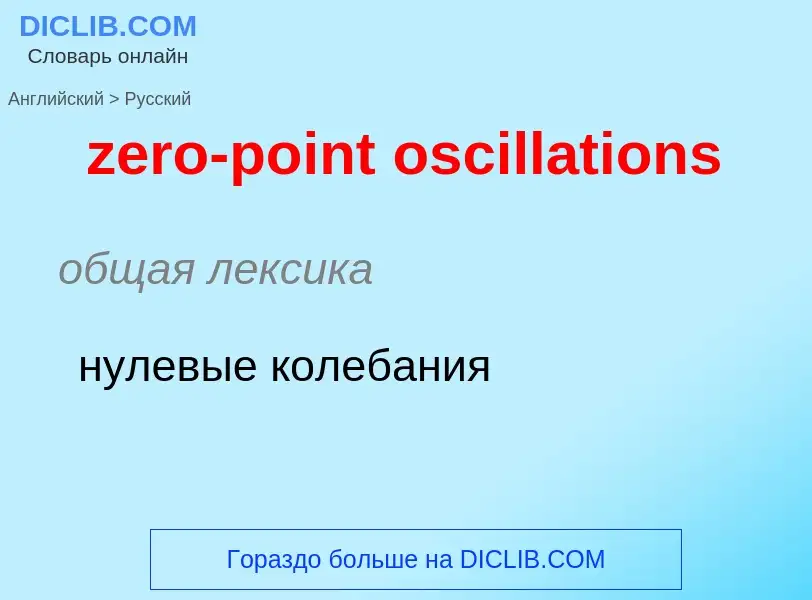Tradução e análise de palavras por inteligência artificial ChatGPT
Nesta página você pode obter uma análise detalhada de uma palavra ou frase, produzida usando a melhor tecnologia de inteligência artificial até o momento:
- como a palavra é usada
- frequência de uso
- é usado com mais frequência na fala oral ou escrita
- opções de tradução de palavras
- exemplos de uso (várias frases com tradução)
- etimologia
zero-point oscillations - tradução para russo
общая лексика
нулевые колебания
['zi(ə)rəupɔintenədʒi]
физика
энергия нулевых колебаний
нулевая энергия
общая лексика
нулевая точка (точка начала или прекращения жизнедеятельности организма)
Definição
Wikipédia

Zero-point energy (ZPE) is the lowest possible energy that a quantum mechanical system may have. Unlike in classical mechanics, quantum systems constantly fluctuate in their lowest energy state as described by the Heisenberg uncertainty principle. Therefore, even at absolute zero, atoms and molecules retain some vibrational motion. Apart from atoms and molecules, the empty space of the vacuum also has these properties. According to quantum field theory, the universe can be thought of not as isolated particles but continuous fluctuating fields: matter fields, whose quanta are fermions (i.e., leptons and quarks), and force fields, whose quanta are bosons (e.g., photons and gluons). All these fields have zero-point energy. These fluctuating zero-point fields lead to a kind of reintroduction of an aether in physics since some systems can detect the existence of this energy. However, this aether cannot be thought of as a physical medium if it is to be Lorentz invariant such that there is no contradiction with Einstein's theory of special relativity.
The notion of a zero-point energy is also important for cosmology, and physics currently lacks a full theoretical model for understanding zero-point energy in this context; in particular, the discrepancy between theorized and observed vacuum energy in the universe is a source of major contention. Physicists Richard Feynman and John Wheeler calculated the zero-point radiation of the vacuum to be an order of magnitude greater than nuclear energy, with a single light bulb containing enough energy to boil all the world's oceans. Yet according to Einstein's theory of general relativity, any such energy would gravitate, and the experimental evidence from the expansion of the universe, dark energy and the Casimir effect shows any such energy to be exceptionally weak. A popular proposal that attempts to address this issue is to say that the fermion field has a negative zero-point energy, while the boson field has positive zero-point energy and thus these energies somehow cancel each other out. This idea would be true if supersymmetry were an exact symmetry of nature; however, the LHC at CERN has so far found no evidence to support it. Moreover, it is known that if supersymmetry is valid at all, it is at most a broken symmetry, only true at very high energies, and no one has been able to show a theory where zero-point cancellations occur in the low-energy universe we observe today. This discrepancy is known as the cosmological constant problem and it is one of the greatest unsolved mysteries in physics. Many physicists believe that "the vacuum holds the key to a full understanding of nature".

![[[Liquid helium]] retains [[kinetic energy]] and does not freeze regardless of temperature at standard atmospheric pressure due to zero-point energy. When cooled below its [[Lambda point]], it exhibits properties of [[superfluidity]]. [[Liquid helium]] retains [[kinetic energy]] and does not freeze regardless of temperature at standard atmospheric pressure due to zero-point energy. When cooled below its [[Lambda point]], it exhibits properties of [[superfluidity]].](https://commons.wikimedia.org/wiki/Special:FilePath/2 Helium.png?width=200)
.png?width=200)
![Timeline of the [[metric expansion of space]]. On the left, the dramatic expansion occurs in the [[inflationary epoch]]. Timeline of the [[metric expansion of space]]. On the left, the dramatic expansion occurs in the [[inflationary epoch]].](https://commons.wikimedia.org/wiki/Special:FilePath/CMB Timeline300 no WMAP.jpg?width=200)

.jpg?width=200)

![quantum theory]] quantum theory]]](https://commons.wikimedia.org/wiki/Special:FilePath/Max Planck (Nobel 1918).jpg?width=200)



![Wide field view of the neutron star [[RX J1856.5-3754]] Wide field view of the neutron star [[RX J1856.5-3754]]](https://commons.wikimedia.org/wiki/Special:FilePath/Wide field view of the sky around the very faint neutron star RX J1856.5-3754.jpg?width=200)

